Welcome! I hope you’re enjoying all of the amazing posts from the 18 participating SLPs in this “Happy to be an SLP Blog Hop”! If this is your first stop, you should know a few things. This blog hop is FULL of great information, ideas, and more! Start at the first blog by clicking below and hop along. Make sure to collect the letter from each blog post. At the end of the hop, you’ll have a chance to enter that word/phrase to win several prizes including TpT Gift Certificates! Make sure to read through the posts too… these SLPs have taken a lot of time to prepare quality material for you. I hope you enjoy… and to start you off, here is an amazing video! 😉
Now… on to my post:
Picky Eating vs Feeding Disorders
Many children that we encounter as Speech-Language Pathologists not only have developmental disorders/delays but also difficulties with foods, textures, etc. When parents bring up concerns with their child’s eating habits many members of the child’s team may be involved including OT, Speech, Psychologist, and pediatrician. Several factors go into determining if a child is displaying picky eating or a feeding disorder:
There are a few similarities between the two. The difference is in the impact of the eating on the child’s health and family as well as length of time that it has continued. Picky eating is transient while a feeding disorder is ongoing.
One of the largest populations of children that display feeding difficulties are children with Autism Spectrum Disorders (ASD).
As speech therapists, we are often involved in the management of feeding difficulties. It may not be apparent if the behaviors are developmentally apropriate and will resolve on its own, or it is a problem which will lead to long-term difficulties. SLPs and all care team members should listen to parents when they report a feeding problem. Focused feeding histories that includes length of the feeding problem, any time that the child was NPO for a prolonged period of time, and if the child received medical interventions in the past. Additional assessments and management of feeding difficulties should include, according to Marshall & Dodrill:
For SLPs, it is important to design therapy that is based on evidence, the child and family, and assessment. Here are the top 10 Therapy Tips from Marshall & Dodrill’s 2011 ASHA Presentation:
1 – Be Predictable: Use visuals, prepare children with auditory information, use transition songs.
2 – Consider contributions of sensory sensitivities: Consult OT and use a “sensory warm-up” before treatment.
3 – Ensure child is in a posturally stable position: Ideal position is feet flat on floor, hips at 90 degrees, and table at elbow height. Use sensory tools if necessary.
4 – Always work with hierarchies in mind: Establish routine, use “food chaining”, child must be processing sensory input for success.
5 – Consider contributions of motor skills deficits: Initiation and sequencing of the task.
6 – Be in tune with the child’s sensitivities and distress cues before you begin challenging them.
7 – Break “food jags”: Begin after several weeks of therapy, with warning you can make small but noticeable changes to familiar foods (shape, color, taste, texture).
8 – Move Slowly: Keep parents involved about speed of therapy because if you go too fast it may backfire.
9 – Provide parent education and support simultaneously: Educate parents about all child sensory, oral motor, and mealtime skills. Encourage parents to make food and interaction with food part of their daily routine.
10 – Always consider generalization and be working on it.
Here are some other great ideas from McCormick & Markowitz:
MBSS may also be necessary depending on the difficulty that the child is demonstrating.
Childhood feeding difficulties can range from picky eating to feeding disorders. It is often necessary to have a multidisciplinary approach for diagnosis and treatment. If the SLP has an understanding of the complex nature of determining and treating a feeding disorder, they can better support and educate the family and child. For more information, check out these great resources/sources utilized in this post:
“Picky Eater or Feeding Disorder” by Valerie McCormick & Goldie Markowitz
“Feeding and the child with ASD” by Jeanne Marshall & Dr. Pamela Dodrill
I hope this information has been helpful to you!
Don’t forget to enter the drawing for one of these great prizes:
Here is your letter for the drawing:
Now, you can return to the first post or hop along to the next! Enjoy!!!

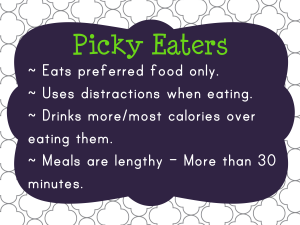
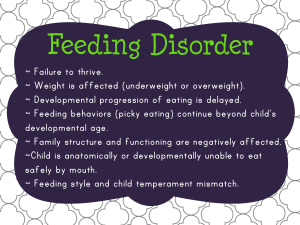
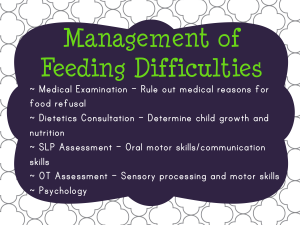
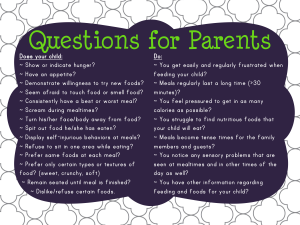
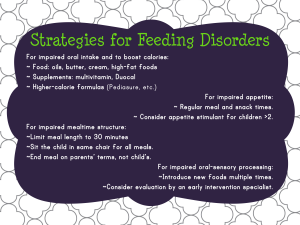
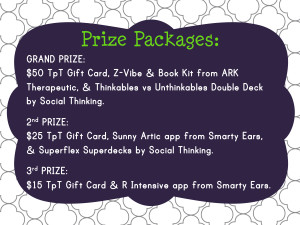
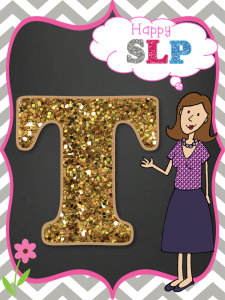


Thanks for the super fun blog hop! I love feeding therapy so I’m always excited to see great information getting out to the public. Happy BHSM!
Kelly
Speech2u